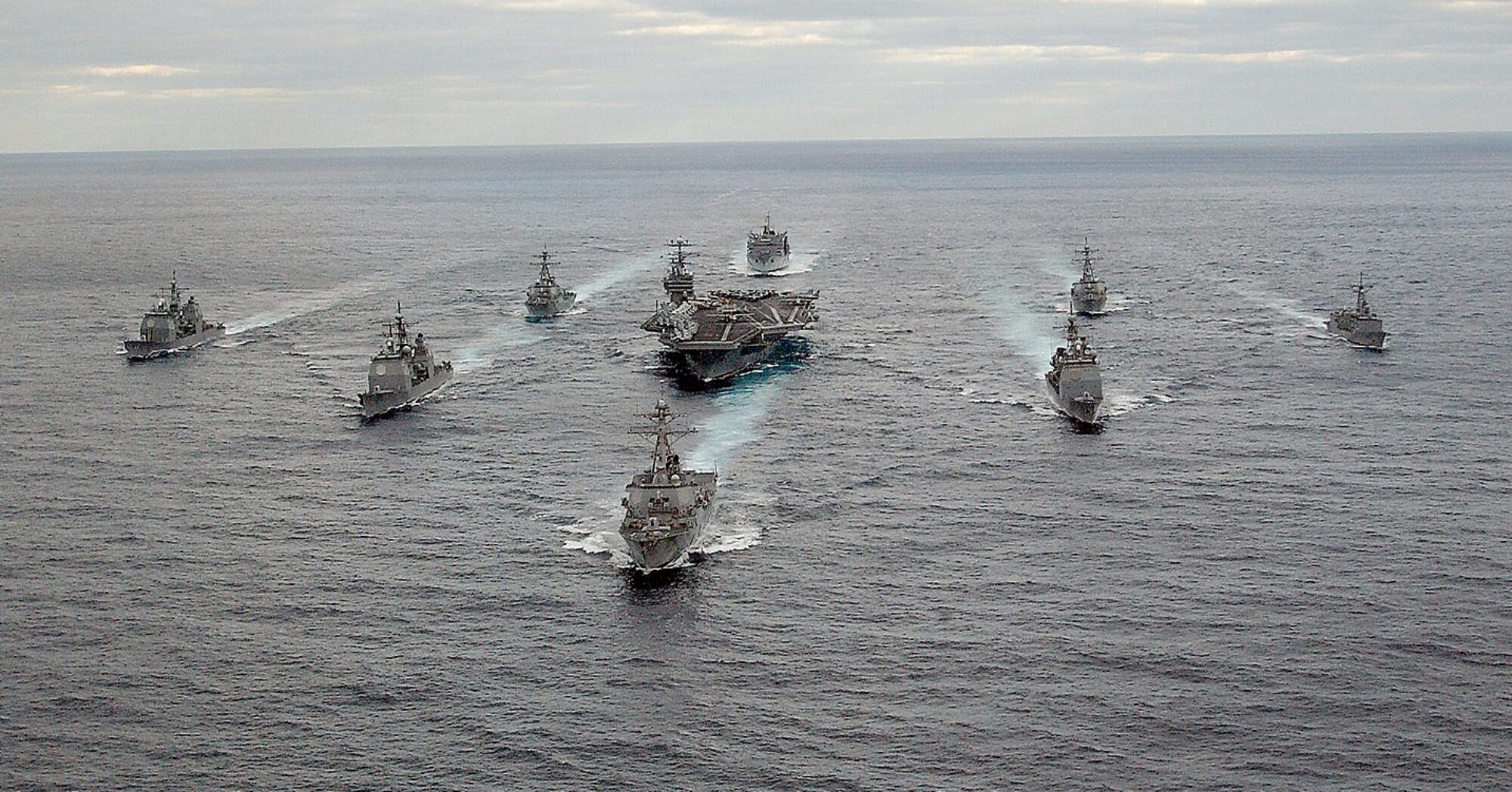Introduction from Americans for a Stronger Navy:

Hello, Bill Cullifer here with Americans for a Stronger Navy. Welcome to our inaugural episode of this enlightening series where we delve into transformative technologies reshaping naval operations. Throughout this series, we will explore various cutting-edge topics, including AI, unmanned systems, Directed Energy Weapons, cyber warfare, and more. Today, we begin with the crucial role of Artificial Intelligence in naval warfare.
Series Outline:
- AI in Naval Warfare – This episode.
- Uncrewed Systems – How drones and autonomous vehicles are changing naval tactics.
- Directed Energy Weapons – The future of combat with lasers and high-energy systems.
- Cyber and Electronic Warfare – Securing supremacy in digital battlefields.
- Future Naval Strategies – Integrating new tech into traditional naval doctrines.
Overview: The Strategic Importance of AI in Military Operations AI’s role in military operations extends from enhancing logistical support to refining combat strategies. Its integration into naval operations promises significant advancements in operational efficiency and tactical decision-making.
Interview Segment: Insights from Admiral James Stavridis
We feature key insights from Admiral Stavridis during his interview with Fareed Zakaria on GPS. His expertise illuminates AI’s potential in transforming naval capabilities.
- Logistics and Maintenance: AI’s predictive capabilities ensure higher readiness and efficiency.
- Strategic Decision-Making: AI’s ability to analyze historical data aids in crucial decision-making processes.
- Advanced Threat Response: The evolving role of AI in managing drone swarms and other asymmetric threats.
Why It Matters: Understanding the integration of AI into naval operations is crucial for anticipating how future conflicts will be managed and fought. AI not only enhances current capabilities but also opens new avenues in warfare strategy.
Implications for the Navy: Admiral Stavridis’ insights lead into a broader discussion on:
- The necessity for ongoing training and adaptation among naval personnel to leverage AI effectively.
- The potential shifts in naval strategy as AI technologies mature, particularly in terms of autonomous decision-making and real-time strategy adjustments.
- Ethical and security considerations as AI becomes a pivotal element in defense.
Interview: CNN ZAKARIA and ADM. JAMES STAVRIDIS (RET.), FORMER NATO SUPREME ALLIED COMMANDER

- CNN ZAKARIA: We humans have a lot to worry about these days, climate change and other pandemic, even the threat of World War Three. But the unregulated development of artificial intelligence might be as potent a threat as any, according to my next guest. He was NATO’s allied commander Eirope. And he’s now vice chair of global affairs at the Carlisle Group. His fascinating new book “2054 Novel,” which he co-wrote with Elliot Ackerman, very talented, is centered on the existential treat AI poses for the future of the world. Jim, pleasure to have you on. Fascinating how you’re writing these series of books. And this one is really about the A.I. race in military affairs. So first, I want to ask you, explain to us the power of A.I.
- CNN ZAKARIA: So, you’re a — you’re a naval commander, what would A.I. allow you to do as a naval commander that you weren’t able to do when you were actually commanding ships?
- ADM. JAMES STAVRIDIS (RET.), FORMER NATO SUPREME ALLIED COMMANDER: Let me give you three very practical things. Number one — and it doesn’t sound sexy, but it’s logistics and maintenance. Artificial Intelligence has a capability to predict when a particular set of maintenance functions are needed, make sure that the spare parts are in train, all of that done in a way that is much more efficient, much more capable.
- ZAKARIA: But that’s huge because it keeps the ships in permanent readiness.
- STAVRIDIS: Absolutely. We always say in the military, the amateurs are the ones talking about strategy. The professionals are focused on logistics. That’s what wins wars.
- But number two, artificial intelligence will allow a commander — say I was the captain of a destroyer, which I was. If I had an A.I. advising me, plugged into my decision process, that A.I. will have access to every naval battle ever fought. It would be capable of scanning the horizon of history and whispering into the commander, you really ought to think about this.
- And then third and finally, and we’re seeing the edges of this in Ukraine, drone, swarms, bringing them together in very lethal ways. We currently can’t quite do that. Artificial intelligence will make swarming drones the greatest threat by mid-century.
- ZAKARIA: You talk a lot about the A.I. race and it’s really U.S. versus China.
- STAVRIDIS: Yes.
- ZAKARIA: Who’s ahead?
- STAVRIDIS: U.S. marginally ahead. Our mutual friend, Eric Schmidt, did a marvelous set of research on this a couple of years ago, and he would have said then, we’re about a year ahead of China.
- My sense from my sources, China is closing that gap. This is the foot race that will determine geopolitical superiority by mid-century.
- ZAKARIA: Are we building the right kind of military for that kind of world?
- STAVRIDIS: Absolutely. And let me add another example in terms of drones versus naval. Look what’s happening in the Black Sea. The Russian Black Sea fleet a third of it is on the bottom of the Black Sea, drinking seawater as we would say in the business.
- Why? Not because Ukraine has a Navy, they don’t. It’s because the Ukrainians have used both air and surface drones. So, to your question
- ZAKARIA: Drones are amazing. The minister showed them to me. They looked like toy boats —
- STAVRIDIS: Yes.
- ZAKARIA: — and they are really highly lethal drones that can sink these hundred — hundreds of millions of dollars’ worth of warships.
- STAVRIDIS: Correct. And so, the question then becomes, are the carriers still viable? I think they are for the moment, for the tenure future, 15-year future. Boy, you get much beyond that. And the capacity of massive swarms of drones accompanied by cruise missiles, ballistic missiles, all linked together by artificial intelligence, it will make those crown jewels of the fleet, our aircraft carriers vulnerable.
- ZAKARIA: So, you’ve — you’ve held very, very high military office. And you know that there are some people who worry that Donald Trump, where he to be elected again, would politicize the military. Do you worry about that?
- STAVRIDIS: I do. And I think that the greatest aspect of our national security isn’t a political military. And we would edge in to politics into that force at great peril to the republic. At the moment, all of my contacts in the active-duty military reassure me that the military continues to regard itself as apolitical, followers of the constitution. Let’s hope it stays that way.
- ZAKARIA: And when you look at NATO, you were the former supreme allied commander, great, great title, by the way, there are people in Europe who worry a lot about Trump and NATO. And what I’ve heard people say is it’s — he doesn’t have to pull out of NATO. He just has to say, I’m not going to defend Latvia, Lithuania —
- STAVRIDIS: Estonia.
- ZAKARIA: Right. Because it’s a sort of — in some ways the whole — NATO is basically — it’s a psychological game. It’s the thread is psychological that the U.S. will get involved. That’s what Putin has to be calculating. And if the president says something like that — the NATO — the building can continue, the meetings can continue, but the heart of it is lost.
- STAVRIDIS: We always say deterrence is the combination of capability and credibility.
- NATO is incredibly capable. The defense budget of the United States and the Europeans together is well over 10 times that of Russia. The population is well over five times the size of Russia.
- So, the capability is not the problem. You’ve put your finger on it, it’s the credibility. And yes, I would be very concerned about a Trump presidency that did not actively support and, indeed, lead within NATO. That’s a real concern.
- ZAKARIA: From the former supreme allied commander of NATO.
- STAVRIDIS: My pleasure, Fareed.
- ZAKARIA: Thank you, sir.
- STAVRIDIS: Thank you.
Further Viewing
Carrie Council interview with Elliot Ackerman and Admiral Stavridis:
Outro
Thank you for joining us for the first episode of our series. Don’t forget to subscribe to our podcast on your favorite platform to ensure you don’t miss any of our discussions on the future of naval warfare. Together, we aim to keep you informed and engaged with the latest in naval defense technology.

